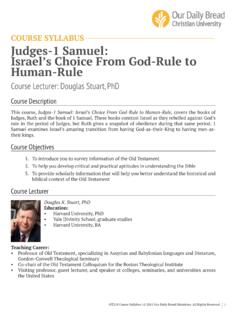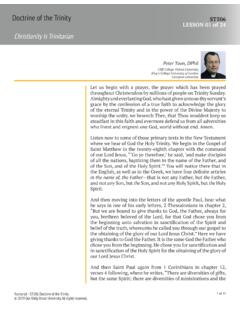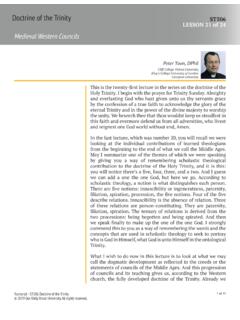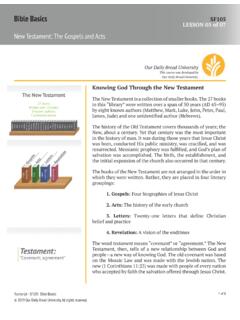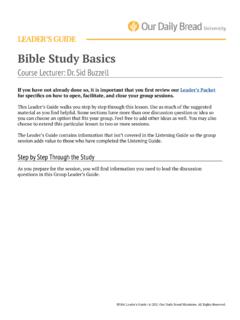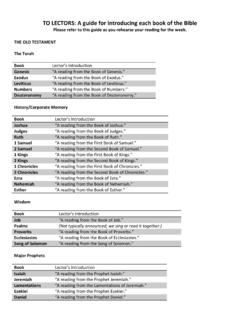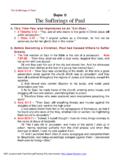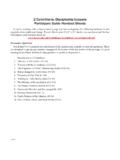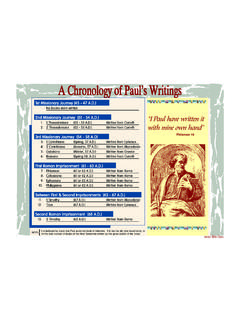Transcription of Understanding the Bible: The Letters of Paul
1 Mark StraussQ0423 Apply Timeless Truths to Your LifeWhen writing to the New Testament churches and individuals, the apostle paul s Letters were filled with practical instruction for daily living as well as deep, theological insights. We are wise to understand why paul wrote these Letters so that we can apply these truths to our lives in light of the gospel. Let s take a few moments to look at the life and writings of paul . You ll see how he was radically transformed by the grace of Jesus and how that affected his steadfast pursuit of encouraging others to live in appreciation of that L. Strauss is an American biblical scholar and professor of New Testament at Bethel Seminary San Diego, where he has served since 1993. He is the author of numerous books and articles, and his areas of expertise include the New Testament Gospels and Bible order more of The Letters of paul or any of over 100 other titles, visit THE BIBLEThe Letters of PAULQ0423_c Letters of 1-26/21/19 10:13 AM11introductionUnderstanding the BibleThe Letters of PaulNearly half of the New Testament, 13 of 27 books, are written by the same person: the apostle paul .
2 Writing to both individuals and churches, paul brought the gospel of Jesus Christ to the lives of many. His Letters contain the heights of theology and the depths of everyday living. But they are just that, Letters . While they hold timeless truths about God and life, they 2 THE Letters OF paul were penned to a particular group, for a particular reason, and at a specific time. Reading them can be confusing even Peter admits that some of the things paul writes are hard to understand. Hard, but not impossible. Turn these pages to be introduced to that man, his writings, and how they are for us Daily Bread MinistriescontentsoneIntroducing paul ..5twoPaul s Letters in Context ..13threeReading paul s Letters Today ..27 EDITORS: Tim Gustafson, Hudberg, Peggy WillisonCOVER IMAGE: Jeff Baxter Our Daily Bread Ministries COVER DESIGN: Stan MyersINTERIOR DESIGN: Steve GierINTERIOR IMAGES: ( ) Jeff Baxter Our Daily Bread Ministries; ( ) Rembrandt van Rijn via Public Domain; ( ) ; ( ) Rawpixel via Scripture quotations, unless otherwise indicated, are taken from THE HOLY BIBLE, NEW INTERNATIONAL VERSION , NIV Copyright 1973, 1978, 1984, 2011 by Biblica, Inc.
3 Used by permission. All rights reserved worldwide. 2019 Our Daily Bread Ministries, Grand Rapids, MIAll rights reserved. Printed in USA5oneIntroducing PaulAfter beginning as the church s greatest enemy, the apostle paul was transformed into its most able defender. Following a dramatic encounter with the resurrected Lord, paul passionately fulfilled the commission Jesus gave him, traveling thousands of miles on foot and planting churches throughout the Roman Empire. He suffered extraordinary hardships: deprivation, beatings, stoning, shipwrecks, imprisonments, and assassination attempts. As a brilliant theologian, he corresponded frequently with his churches. Thirteen of these Letters now comprise over a quarter of the New Testament. Apart from Jesus himself, no one shaped Christianity to a greater extent than paul . But from 6 THE Letters OF PAULPaul s own perspective, he was merely a slave of Jesus Christ, a laborer and field hand doing his duty in response to the extraordinary, undeserved, and unfathomable gift of salvation God had provided through our Lord and Savior Jesus Christ.
4 In this booklet we will examine the life and Letters of paul . Who was Saul/ paul ?We know about paul from two main sources: the book of Acts (written by Luke) and paul s own Letters . In his Letters , he is always paul (Greek: Paulos), but in Acts, he is both Saul and paul . Saul was his Jewish name, given to him at birth. paul was his Roman name, likely also given at birth, because his family had Roman citizenship. Luke calls him Saul until his first missionary journey, when he switches to paul (acts 13:9). Saul probably began using his Roman name when his ministry turned primarily to the Gentiles (non-Jews). Saul is first mentioned in Acts at the stoning of Stephen, the first Christian martyr (acts 6:1 7:60). The witnesses to the stoning laid their robes at the feet of a young man named Saul, who approved of their killing him (a c t s 8:1). Saul viewed Stephen as an enemy of Judaism because of his preaching about Jesus, who, from Saul s perspective, was a false messiah.
5 Saul calls himself a Hebrew of Hebrews, meaning an authentic and faithful Jew (philippians 3:5 6). He was a member of the Pharisees (philippians 3:5; acts 23:6), a Jewish political and religious party that stressed meticulous observance of the Jewish Law. He was Introducing paul 7trained by Gamaliel, one of the leading rabbis of his day (acts 22:3; cf. 5:34), advancing in Judaism beyond many of my own age (gal ati ans 1:14). Because of his zeal, Saul considered the followers of Jesus to be a threat to Judaism and he tried to destroy this new movement, arresting men and women and putting them in there is another important side to Saul. He was born in Tarsus, a Gentile city, in the province of Cilicia (southeastern turkey today; acts 21:39). He was therefore Hellenized, meaning he spoke Greek and had a good knowledge of Greek ways. This background prepared him well to be the apostle to the Gentiles. Saul was also a Roman citizen, which brought him many rights and privileges that others in the empire did not have.
6 They could not be beaten or imprisoned without a trial. They could appeal to Caesar and be tried before the emperor in Rome. paul was born into his Roman citizenship. It was a valuable asset, and paul used it to his s ConversionPaul s conversion is narrated in Acts 9:1 9 and is recounted twice by paul elsewhere in Acts (22:6 16; 26:12 18) and mentioned in his Letters (gal ati ans 1:13 16; philippians 3:4 8). It probably occurred three to five years after the resurrection of Jesus. Having begun 1 Gal. 1:13; 1 Cor. 15:9; Phil. 3:6; Acts 7:58; 8:3; 9:1 Acts 16:37 40; 22:25 29; 23:27; 25:10 12; 26:32; 28:198 THE Letters OF PAULa major persecution against the Christians, paul requested Letters of reference from the high priest in Jerusalem to the synagogues in Damascus, Syria, for permission to arrest Christians there (followers of the way ; acts 9:2).On the road to Damascus, however, a bright light flashed around Saul, and a voice called out to him, Saul, Saul, why do you persecute me?
7 Saul answered, Who are you, Lord? and the voice responded, I am Jesus, whom you are persecuting. Saul was blinded by the light, and led by his companions into the city of Damascus. There, the Lord sent a man named Ananias, who restored Saul s sight and baptized him. This encounter turned Saul s life upside down. Before he had viewed Jesus as a false prophet and a messianic pretender; now he realized Jesus was the promised Savior of the world and the hope of all humanity. Jesus s execution was not merely the tragic fate of a misguided zealot; it was God s purpose and plan an atoning sacrifice to pay for the sins of the world. The Christians Saul had persecuted were not deluded followers of a liar and blasphemer. They were the true people of God who had responded in faith to God s plan of salvation. The transformation of Saul is one of the great proofs of the truth of Christianity. What could have caused a zealous persecutor of the church to make a 180-degree turn and become its greatest supporter?
8 The only reasonable explanation is what paul himself says: On that Damascus road he met the resurrected Christ, Introducing paul 9who called him into service. This is remarkable evidence that Jesus arose from the dead, confirming that he was who he claimed to be: the Savior of the s CommissionPaul viewed his mission as taking this good news of salvation to the ends of the earth, and to preach the good news to the This salvation was first for the Jews (rom ans 1:16 17), the original recipients of the promise, so in every town paul preached first in the Jewish Israel was to be a light to the nations (isaiah 49:6), so paul would first call Israel to faith in their Messiah (see acts 13:16 42). The response was generally as follows: A small number of Jews would believe and a larger number of Gentile God-fearers. God-fearers were Gentiles who attended synagogue services to worship the one true God. If paul got expelled from a synagogue, he would move to the town squares or other venues and continue to preach.
9 Small house churches were started, with Christ-followers worshiping together and sharing the good news with others. paul would then move on to the next town and repeat this pattern. Despite great opposition, paul started a remarkable number of churches throughout the Roman empire, 3 Rom. 1:1 4, 13; 11:13; 15:16 18; Gal. 1:16; 2:2, 7 9; Eph. 3:8; 1 Tim. 2:7; 2 Tim. 4:17; Acts 9:15; 13:47; 22:21; 26:174 Acts 13:14; 14:1; 17:1 2, 10, 17; 18:4, 19; 19:810 THE Letters OF paul establishing a legacy as the greatest missionary, church planter, and theologian of all time. Yet paul would claim no credit for any this, since it was all through God s grace: All this is from God, who reconciled us to himself through Christ and gave us the ministry of reconciliation (2 corinthians 5:18). paul s GospelWe often speak of paul s conversion to Christianity, but paul would not have viewed his Damascus Road experience this way. For paul , Christianity was not a new religion; it was Judaism fulfilled.
10 He now understood it completely. His conversion was the recognition that Israel s salvation had arrived through the life, death, and resurrection of Jesus the Messiah and was now available to all people everywhere. This salvation was necessary because of human brokenness. When Adam and Eve disobeyed God in the Garden (ge n e sis 3), they rejected God s authority and became fallen human beings, alienated from their Creator. In his Letters paul outlines the consequences of human sin spiritual and physical death. Sin and death spread to all people everywhere (rom ans 1:18 3:20; 5:12 19). Yet God set in motion a plan to bring humanity and a fallen creation back to himself. Through Christ s perfect life and sacrificial death on the cross, he bore our sin and opened the way to be reconciled to God. Human beings can now be justified (declared righteous) through faith in Christ s death on the cross (romans 3:21 26; Introducing paul 112 corinthians 5:17 21).

